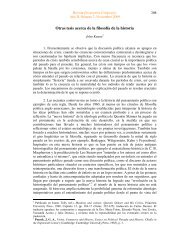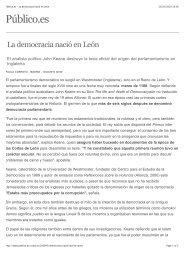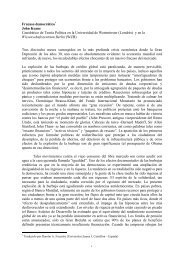Alexandre Koyré, 'The Political Function of the Modern Lie ...
Alexandre Koyré, 'The Political Function of the Modern Lie ...
Alexandre Koyré, 'The Political Function of the Modern Lie ...
You also want an ePaper? Increase the reach of your titles
YUMPU automatically turns print PDFs into web optimized ePapers that Google loves.
interest; in contexts such as Iran and China, citizen journalism is even posing a<br />
genuine threat to secretive, heavy-handed abuses <strong>of</strong> power. Picking up on this trend,<br />
John Hartley and o<strong>the</strong>rs have praised <strong>the</strong> recent rapid expansion <strong>of</strong> a culture <strong>of</strong><br />
redaction. He speaks <strong>of</strong> a „redactional society‟ in which citizens are engaged as<br />
producers in sifting through <strong>the</strong> chaos <strong>of</strong> <strong>the</strong>ir information worlds by „learning how to<br />
share, deploy, trust, evaluate, contest and act upon collective knowledge‟. 1 In much<br />
<strong>the</strong> same vein, Umberto Eco and o<strong>the</strong>rs have spoken <strong>of</strong> <strong>the</strong> contemporary importance<br />
<strong>of</strong> „overstanding‟, a form <strong>of</strong> interpretation <strong>of</strong> <strong>the</strong> world which does more than ask<br />
questions and produce answers posed by <strong>the</strong> myriad <strong>of</strong> symbolic artefacts surrounding<br />
us. Overstanding, which should not be confused with over-interpretation, is <strong>the</strong><br />
thoughtful activity <strong>of</strong> posing questions that <strong>the</strong>se power-ridden symbolic materials<br />
o<strong>the</strong>rwise take for granted, frustrate, silence or deny outright. 2 These emphases on <strong>the</strong><br />
contributions to public life by citizens are important for <strong>the</strong> way <strong>the</strong>y highlight <strong>the</strong><br />
possibility <strong>of</strong> expanding and democratising <strong>the</strong> role <strong>of</strong> public commentary in <strong>the</strong> age<br />
<strong>of</strong> monitory democracy. But <strong>the</strong>ir chief limitation, in my view, is <strong>the</strong> way <strong>the</strong>y ignore<br />
<strong>the</strong> threats to veracity posed by <strong>the</strong> displacement <strong>of</strong> what might be called edification.<br />
Edification: here I am playing with <strong>the</strong> family <strong>of</strong> terms linked to <strong>the</strong> words editing and<br />
education and <strong>the</strong>ir Latin root (aedificare: to build, from aedis „dwelling‟ and facere<br />
make) to refer not only to <strong>the</strong> vital and inescapable importance for democracy <strong>of</strong><br />
intelligent editorial judgements about how to represent <strong>the</strong> world; but also to <strong>the</strong><br />
downside effects that happen when conventional editorial practices are wrong-footed<br />
by working conditions, and by „amateur‟ journalists and <strong>the</strong>ir defenders, who are<br />
prone to talk loosely <strong>of</strong> <strong>the</strong> importance <strong>of</strong> replacing authoritative truth with<br />
collectively produced, horizontal truth. It is all very well to place emphasis on self-<br />
chosen citizen representatives actively hashing through competing interpretations,<br />
instead <strong>of</strong> deferring to authoritative sources <strong>of</strong> information. But <strong>the</strong> inconvenient point<br />
is that sloppy journalism and online mis-reportage, false rumours and nonsense<br />
evidently flourish in <strong>the</strong> age <strong>of</strong> communicative abundance. Take just one randomly<br />
selected example, <strong>the</strong> recent moment (early November 2010) <strong>of</strong> panic and confusion<br />
1 John Hartley, „Communicative Democracy in a Redactional Society: The Future <strong>of</strong> Journalism<br />
Studies‟, Journalism 1, no. 1 (2000), pp. 39-47.<br />
2 See Umberto Eco, Interpretation and Overinterpretation: Umberto Eco with Richard Rorty, Jonathan<br />
Culler and Christine Brooke-Rose, edited Stefan Collini (Cambridge 1992); see also Wayne C. Booth,<br />
Critical Understanding: The Powers and Limits <strong>of</strong> Pluralism (Chicago 1979).<br />
12





